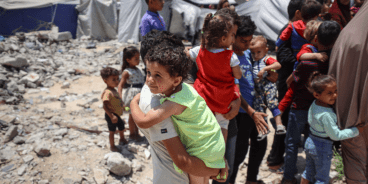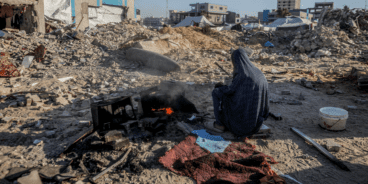
Remarks Delivered at UN General Assembly Side Event on “Atrocities Against Rohingya: From Condemnation to Action”
Remarks delivered by Dr. Simon Adams, Executive Director of the Global Centre for the Responsibility to Protect, on 24 October 2017 at UN Headquarters in New York. The side event was cohosted by the Permanent Mission of Bangladesh to the UN and the Global Centre for the Responsibility to Protect.
Excellencies, colleagues, thank you for being here today on a very important and pressing topic – Atrocities against Rohingya: From Condemnation to Action. My name is Simon Adams from the Global Centre for the Responsibility to Protect, and I would like to acknowledge our co-host for this event, the Permanent Mission of Bangladesh.
The security forces of Myanmar initiated so-called “clearance operations” in Rakhine State on 25 August, after an armed group calling itself the Arakan Rohingya Salvation Army (ARSA) attacked a number of police posts and an army base.
Since that date there have been widespread reports of Myanmar security forces imposing collective punishment upon the entire ethnic Rohingya community in northern Rakhine – including women and children – through unlawful killings, sexual violence, and forced displacement.
This targeted campaign has included the burning (and near total destruction) of more than 288 Rohingya villages according to satellite imagery analyzed by our colleagues at Human Rights Watch.
The report released this month by the UN Office of the High Commissioner for Human Rights found that the attacks carried out by Myanmar security forces were “well-organised, coordinated and systematic” in nature. Their aim was to drive the Rohingya population out of Myanmar and to prevent their return.
While the current crisis has seized the world’s attention, it has been decades in the making. The Rohingya, a distinct Muslim ethnic minority group in Myanmar, have been systematically marginalized and discriminated against for generations. The 1982 Citizenship Law does not recognize the estimated 1 million Rohingya as one of Myanmar’s “national races,” rendering the vast majority of that population stateless. As a result of other discriminatory laws, Rohingya have been subject to severe restrictions on their freedom of movement as well as on access to employment and education, while more than 120,000 Rohingya have lived in squalid displacement camps in Rakhine State since being driven from their homes by inter-communal violence in 2012.
Overall, the conditions under which Rohingya have lived in Myanmar constitute a form of apartheid in which they have been segregated and marginalized. They are legally disenfranchised and even prohibited from self-identifying on the official census.
Prior to 25 August the Rohingya were already considered one of the most persecuted minority groups on the planet. Since then many UN officials and entities – including the High Commissioner for Human Rights – have stated that the actions taken by Myanmar authorities during the security operations amount to ethnic cleansing and crimes against humanity. The Special Advisors on the Prevention of Genocide and the Responsibility to Protect have also condemned the atrocities.
At the Global Centre for the Responsibility to Protect, we believe it is evident that the atrocities committed against the Rohingya population represent a policy of ethnic cleansing and constitute crimes against humanity under international law.
During September the Commander in Chief of Myanmar’s military, General Min Aung Hlaing, described the “Bengali problem” (he refuses to use the word Rohingya) as “unfinished business, despite the efforts of the previous governments to solve it.” This raises the obvious question of what kind of “finished business” does the Myanmar military desire?
Indeed, we believe that these atrocities – when combined with the decades-long systematic persecution of the Rohingya – pose an existential threat to them as a people and may ultimately prove to be genocidal in intent. While the terms “prevention” and “early-warning” are regularly intoned at the UN, neither the government of Myanmar, nor the international community, has acted on evidence accumulated over many years.
For our part, the Global Centre has highlighted the threat of atrocities in Myanmar for nine years, and published regular warnings regarding the plight of the Rohingya since 2012.
The world is now witnessing the world’s fastest-growing refugee crisis – with over 600,000 people fleeing to Bangladesh to escape atrocities. The majority of Myanmar’s Rohingya population has been expelled, with no clear path for return.
And in this context I think we should acknowledge the crucial and generous role played by Bangladesh in hosting these refugees. Yet, while there has been progress in addressing their humanitarian needs (including the donor conference that took place in Geneva yesterday), we are yet to witness meaningful action on the international political front.
The principle of the Responsibility to Protect was adopted at the UN World Summit in 2005, following the shameful failure of the international community to adequately respond to mass atrocities committed in Rwanda and former Yugoslavia during the 1990s. Silence and inaction in the face of atrocities tainted the reputation and credibility of the UN and the international community. We must not repeat the mistakes of the past.
The government of Myanmar has a primary Responsibility to Protect all its diverse populations, regardless of ethnicity, religion or citizenship status. Despite the transition to democracy, the current government appears manifestly unwilling to uphold that responsibility. The international community must therefore take appropriate and timely diplomatic action and uphold its responsibilities.
This meeting will explore various tracks that the international community can pursue, including through the Security Council, General Assembly as well as regional and bilateral action.
The international community can no longer prevent atrocities from happening, but it can take action to help end them and to hold perpetrators accountable.
CONCLUSION
Excellencies, colleagues, at the risk of unnecessarily prolonging this gathering, I think the message from today’s meeting is clear – the world must uphold its responsibility to protect the Rohingya people. And I would add, that democracy and prosperity in Myanmar can not be built on the bones of the Rohingya. My own organization joins those who have called for:
- The Myanmar Government to immediately end the violence; allow the safe voluntary return of all Rohingya refugees; fully implement the recommendations of the Rakhine Commission Report; cooperate with Human Rights Council mandated fact-finding mission; and hold all perpetrators of atrocities accountable.
- The UN Security Council should impose an arms embargo on Myanmar and targeted sanctions against those senior military officers with command responsibility for atrocities committed in Northern Rakhine.
- All UN Member States should suspend all ties with the Myanmar military until there has been a complete cessation of violence and accountability for atrocities. States should also review all investment and development assistance to Myanmar in light of the current refugee crisis and ongoing atrocities.
Colleagues, friends, I thank our co-host Bangladesh and the panelists, and I thank you for your patience.
Related Publications


Atrocity Alert No. 442: Israel and the Occupied Palestinian Territory, Myanmar (Burma) and Belarus
